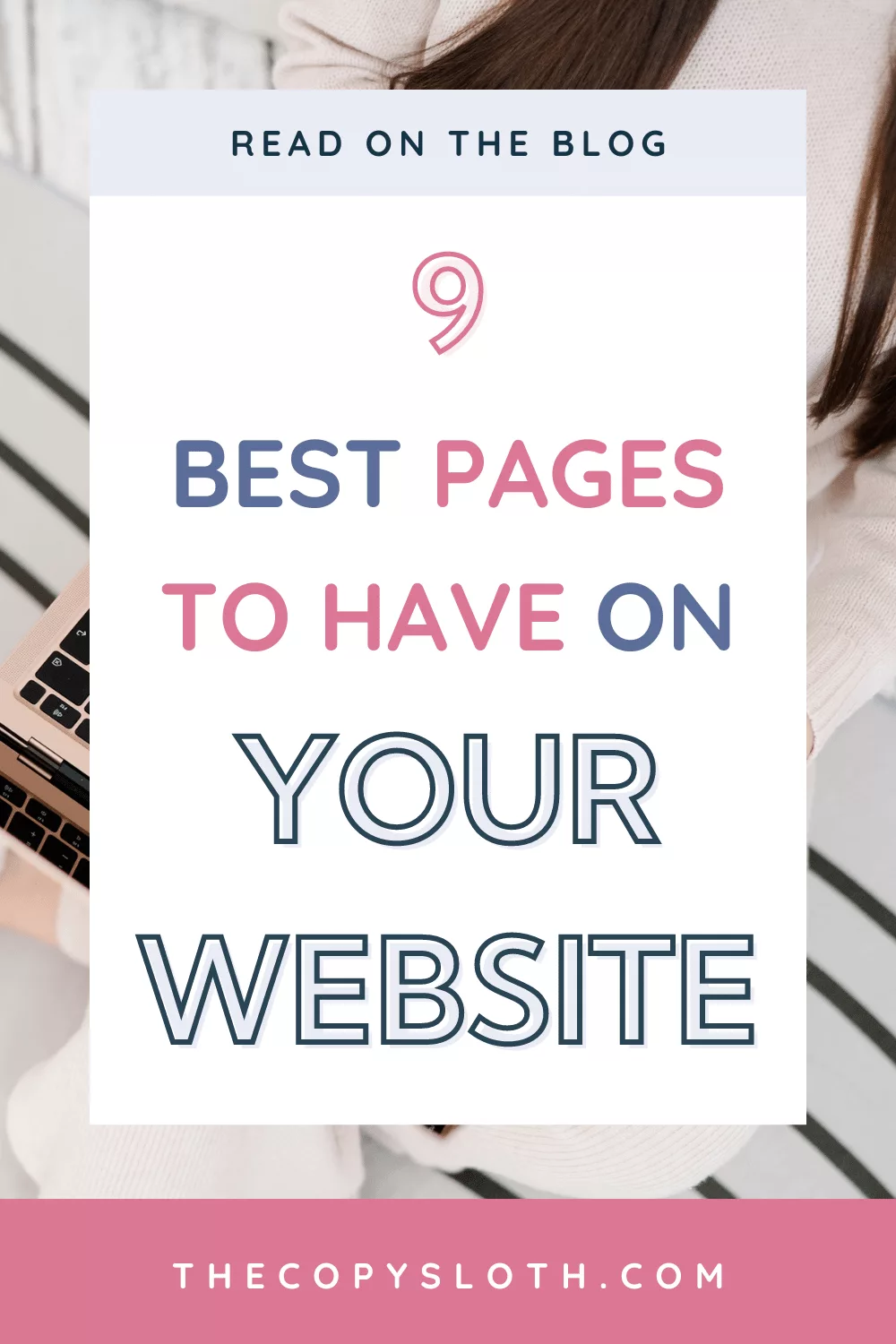This post may contain relevant affiliate links. These give me a small commission at no additional cost to you if you make purchases with them. Please see my disclaimers for more information.
Ever find yourself asking, “What are the most important pages on a website?” Stick with me to find out what the 9 most important website pages really are!

In this post, I talk all about what the most important pages on a website are.
The 9 Most Important Pages for Your Website
There’s one common mistake I’ve seen hundreds of people make over the 17 years I’ve been a website copywriter and designer. The struggle to know EXACTLY what you need is the biggest thing most people miss before planning, creating, writing, and publishing their blog or website. Keep reading to learn how you can turn your stress-site into your online haven.
Table of Contents
What are the most important pages on a website?
If you’re going to bother building one for your blog or business, you really do need all these pages. Most won’t have these 9 must have pages for a website:
- Home page
- About page
- Blog page
- Services or Products page
- Portfolio page
- Contact page
- Legal pages
- Affiliate landing page
- Social media landing page
Home page
For the vast majority of bloggers and online business owners, this is the start and end of a visitor’s journey. I like to think of a home page as your digital door’s welcome mat. Although it might feel like it, a home page is NOT a junk drawer.
Your home page defines your brand: who you are, what you do, and what people can expect to find. But I argue it should go one step further. It should also signal what kind of value you give to your visitors.
Value is determined not by you — but by the people who consume your content. That’s why I STRESS to the heavens that your home page should be as simple as possible: especially in the beginning!
The number one thing I wish more people knew (that I pray you walk away with forever) is that it should be completely accessible. What do I mean by that?
- It should have strategic headers that help organize your content.
- It should not have walls of text as large as The Wall (where are my fellow Game of Thrones fans at?)
- It should be readable to as many people as reasonably possible.
- It should have clear, branded content that doesn’t easily confuse others.
- It should have relevant visuals (graphics, photos, etc.).
About page
Listen up introverts: You can’t afford to skimp on your about page. If you’re like me, you hate the thought of pumping out video after video on social media. But if you have a distinct lack of presence online, your about page HAS to be done right!
The biggest thing I can emphasize here is that your about page really isn’t about you. I bet you’ve heard that one time or five, huh?
- Make your about page about your brand or brand’s story — not you.
- Give your leads and site visitors a peek inside what working with you is like. (That means include a strong testimonial or two.)
- “Bundle” your life up in chapters or by using broad highlights. Get rid of the rest. If you’re unsure about what you need to start with, keep the content simple. You can always add to it later on.
Every about page is important, but not all of them will carry much value to your visitors. Your business, brand, or blog may relate to a highly emotional, spiritual, mental, physical, and even politically charged industry or topic. In this case, zhuzh up (give some love to) your about page!
Blog page
Ready to hear a shocking revelation? One of the most important website pages includes a main blog page. I know, I know! Hand to heart, I admit I’m super biased here. But blogging (as tedious, overwhelming, and slow-burnish as it is) is VALUABLE for every person who runs a website.
Of any kind!
You might not care that having an active blog shows your expertise to your leads and visitors. But Google sure does! Search engine optimization (SEO) is a skill that means I don’t HAVE to shake my booty on social (not that anyone would want to see that).
Blogging has brought me real leads and clients — all because I have a few posts up that are indexed on search engine result pages (SERP). The better you perform on SERP, the more and more traffic comes to your website.
Services or products page
If you have a business or sell products online, this page is non-negotiable! I liken this page to a sales page — especially if you’re a service provider! Shops that see digital or even physical products should be simplified, informative, and easy to navigate.
At a minimum, your products/services page needs:
- Good SEO Keywords — If you want leads on “autopilot”, you need to get serious about search engine optimization. First off, go for the longtail queries/keywords. “Copywriter” will be highly competitive. “Ethical Copywriter” may be a bit better. “Ethical Copywriter for Coaches” tells Google about what you do and who you serve.
- An obvious, abundantly clear hint about what you do or what type of products you sell — This might look like a small header at the top with a tagline that mentions that you’re a copywriter for creative entrepreneurs or say that you sell luxury makeup for sensitive or aging skin.
- Your prices — I spoke at length about the ethical importance of transparency in your marketing efforts previously. Hiding your prices literally serves no one. Nope! Not even you.
- An overview of what you do — Your services, packages, and any information you can give here WITHOUT overloading your visitors with too much is key
- Testimonials, product reviews, and/or case studies — You might not need 40 client or customer reviews, but one really strong testimonial is worth its weight in proverbial gold! You’ll build up some credibility, demonstrate your expertise/experience, and inform your leads about past work you’ve done.
Portfolio page
For service providers, portfolios show past bodies of your work to leads. At least that’s what you’ll hear most people say. I’ve genuinely found that your portfolio is the single most important marketing tool a service provider can have.
A TON of people skip investing enough time to produce and present a strong portfolio. This alone gives service providers who DO spend that time a huge edge. For introverts wary of social media, your portfolio can be the single tool you really need to make money online.
In my first year of business, my portfolio became the best-converting way I brought in clients. When you pair a solid portfolio with a good SEO strategy, valuable website content, and clear messaging, you genuinely can attract clients on what everyone loves to call “autopilot” — mostly because your website helps you do that heavy lifting.
I put together a complete, affordable course that spells out the exact portfolio strategy that made me over $25k in my first full year of business.
- You can ditch that complicated social media strategy.
- You can STOP working for free and/or with nightmare clients.
- You can build an introvert-friendly business around the quality of your work — not how much you post or grow on Instagram.
- You can QUIT investing in expensive courses and overly long programs that don’t mesh well with your introverted nature or lifestyle.
Contact page
A contact page is just a page where people can reach out to you, right? Eh…Kinda sorta. I personally believe your contact page should first reinforce your boundaries to potential leads and clients.
- Will you have a generic form with a field for your email and first name?
- Do you plan to create an exhaustive lead capture form to weed out the unideal clients?
- Should you spell out how casual visitors with questions can reach you with their everyday questions (i.e. by DMing you on Instagram, following you on Twitter, etc.)
You might not see your contact page being much more than a standard “get in touch with me” kind of thing. However, it’s important to make it adaptive to your business, boundaries, and expectations, too!
In general, though, you should ALWAYS list a few things to give your clients, leads, visitors, or customers some way to get in touch with you should they need to:
- Phone number (especially important for product sales)
- Address and/or a public email address (I recommend having one like hello@yourdomain.com)
- Frequently asked questions (this theoretically minimizes the chances of receiving the same Q’s over and over again)
Legal pages
You can’t skip the law. Out of all of these, legal pages are among the most important pages on a website. Skipping any of these leaves you open to the possibility of bad things (and potentially hefty fines).
I’m not a lawyer, and no — this is NOT legal advice! Your legal pages may look different than my list for a number of reasons (e.g. you live in a different state or country). But in general, consider these must have pages for a website:
- Privacy policy — A privacy policy is a document that discloses how a website handles any visitor, client, or customer data and other information it gathers.
- Disclaimers — A disclaimer is a statement that discloses to visitors what a website does not promise or guarantee.
- Terms & conditions — Terms and conditions detail what a website expects of a visitor in terms of practices, etiquette, or rules while they visit it.
- Accessibility statement — An accessibility statement details a website’s accessibility policies, goals, initiatives, and even previous successes pertaining to serving content to anyone who may have a disability.
- Testimonial disclaimer — A testimonial disclaimer is a website’s statement showing visitors that past client or customer success varies and is not guaranteed.
- Affiliate disclosure — An affiliate disclosure informs a visitor that you may or have been compensated in some way for reviewing, recommending, or promoting a product or service.
Speaking of legality, do not copy ANYONE’s policies, procedures, and disclaimers and paste them onto your website. Doing that my fine, introverted friends is copyright infringement. Also highly illegal and ethically sleazy to do.
You can hire someone to write yours, pay a small fee to an online service to generate a generic one, or write one yourself (that’s completely custom to you and your business). However you choose to get these for yours, they’re some of the most important website pages you SHOULD have.
Affiliate landing page
From your favorite course, Amazon products, and must-have tools for your online business, an affiliate landing page is essential for every blogger, service provider, coach, and other online business owners.
You cannot have an article about the most important website pages without mentioning affiliate landing pages! Affiliate landing pages are exactly how they sound: a convenient page to direct curious visitors to as they read your newsletter, blog, or website pages.
In January 2022, I took By Sophia Lee’s Perfecting Blogging & Perfecting Pinterest courses (which both come in a convenient, discounted bundle, too). I’d been itching to blog for a while, so I scoured YouTube for help.
Enter Sophia Lee! I have her to thank for introducing me to the idea of having at least one affiliate landing page. Honestly, you could even likely have more — one for each of your main categories.
Affiliate Page Example + Audit
Here’s what I like about her affiliate landing page for blogging:
- She introduces herself right at the top: This page likely captures leads of all types (cold, warm, and hot. Just in case you have no idea who she is, she greets you and introduces herself right at the top. She also tells you the purpose of the web page.
- She has quick navigation links: These help the visitor navigate the long page to the content they care about.
- She shows off her most popular blog posts on the category/topic: It’s a great way to present your content to people who potentially don’t know who you are, what you do, etc. Beyond that, I like the types of blog posts she includes. They’re posts a ton of people will care about.
- She lists her relevant flagship courses for bloggers + includes a helpful description: Affiliate pages can also be a wonderful place to push your digital products, programs, or courses!
- She presents her affiliate links as recommendations with a helpful overview of each item: This helps keep the information reading as personal as possible.
Social media landing page
Search “social media landing page” on Google, and a variety of different answers pull up in the SERP. Let’s make things simple and clear…
A social media landing page is a navigational tool you create to help steer your followers and audience on social media to specific links, campaigns, or offers.
Design it with a mobile-first approach. Currently, I use a Milkshake “website” for my blog/business, but there are so many other options you can use to get yours live in under 10 minutes. This year, I plan to finally migrate to a custom landing page on my own domain. Honestly, there’s little reason other than convenience to use a third-party app/website.
These will look so different from business to business; however, here are the most common items you may choose to include on your social media landing page:
- Link to your website/blog
- Link to your other social media accounts
- Include a brief, 2-3 sentence bio with your picture
- Include an email/lead magnet opt-in form to grow your list
- Link to an upcoming training
- Link to a product waitlist
This post was all about answering the question, “What are the most important pages on a website?”






